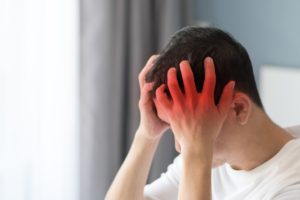 As those who suffer from cluster headaches know, sleep quality may be greatly reduced when an attack strikes. According to a new study published in Headache, sleep quality may be affected due to the occurrence of nocturnal headache attacks.
As those who suffer from cluster headaches know, sleep quality may be greatly reduced when an attack strikes. According to a new study published in Headache, sleep quality may be affected due to the occurrence of nocturnal headache attacks.
Cluster headaches are a primary headache disorder that often affects those aged 20 to 40 years of age. It is the most common of the group of headache disorders called trigeminal autonomic cephalalgias. Cluster headache patterns are thought to align with circadian rhythms, and studies have shown that they are related to sleep disturbances and differences in chronotype. But more research is needed to know the impact of such relationships in terms of pathophysiology.
Cycles Can Last for Weeks or Months
Advertisement
During a cluster cycle, brief but excruciatingly severe headache attacks can occur between one to eight times per night. Cluster cycles can last for weeks or months and are usually separated by remission periods of months or years.
In this cross-sectional study, adults with episodic or chronic cluster headaches were compared with healthy controls. The participants had an average age of 50.4 years and were 74.7 percent men. The study took the participants from the Dutch Leiden University Cluster headache neuro-analysis. All participants were asked to complete web-based surveys that included the Pittsburgh Sleep Quality Index, Circadian Type Inventory, Munich Chronotype Questionnaire, and Hospital Anxiety and Depression Scale.
The outcome of the study found that participants with cluster headaches had earlier chronotypes more often than healthy controls as indicated by a mid-sleep phase occurring earlier. Participants with episodic cluster headaches had more trouble coping with reduced sleep compared with healthy controls, and those with chronic cluster headaches had greater difficulty altering their sleep rhythms.
Overall, participants with chronic or episodic cluster headaches reported reduced sleep quality compared with the control group. For the study, there were 235 patients with episodic cluster headaches who rated themselves as “poor sleepers” and 105 patients with chronic cluster headaches who described themselves in the same way, against 94 participants in the control group. A total of 130, including 63 patients who suffer from episodic and chronic cluster headaches, reported a relationship between sleep pattern and the probability of having a headache attack. There were no significant differences detected for any of the other outcomes.
Authors of the study concluded, “Although the exact causality remains unclear, association between cluster headache and sleep seems robust and remains intriguing. Patients with cluster headache will likely benefit from a structured, regular daily schedule.”
Cluster headache is often said to be the most painful of all headaches. It has been described as “burning,” “like a hot poker in the eye,” and as “suicide headache.” It is understandable why there are sleep disturbances in those who suffer from this type of painful cluster headache. Although not directly proven, cluster headache patients will likely benefit from a structured, regular daily schedule. More research is needed to address how those who suffer from this condition can manage symptoms which in turn could help with quality of sleep.
